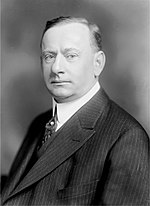Leonidas C. Dyer, Date of Birth, Place of Birth, Date of Death
TweetLeonidas C. Dyer
American politician
 Date of Birth: 11-Jun-1871
Date of Birth: 11-Jun-1871
 Place of Birth: Warren County, Missouri, United States
Place of Birth: Warren County, Missouri, United States
Date of Death: 15-Dec-1957
Profession: lawyer, politician
Nationality: United States
Zodiac Sign: Gemini 
About Leonidas C. Dyer
- Leonidas Carstarphen Dyer (June 11, 1871 – December 15, 1957) was an American politician, reformer, civil rights activist, and military officer who served 11 terms in the U.S.
- Congress as a Republican Representative from Missouri from 1911 to 1933.
- In 1898, enrolling in the U.S.
- Army as a private, Dyer served notably in the Spanish–American War; and was promoted to colonel at the war's end. Working as an attorney in St.
- Louis, Dyer started an anti-usury campaign and was elected to Congress as a Republican in 1910.
- As a progressive reformer, Dyer authored an anti-usury law in 1914 that limited excessive loan rates by bank lenders in the nation's capital, then still governed by Congress.Horrified by the race riots in St.
- Louis and East St.
- Louis in 1917 and the high rate of reported lynchings in the South, in 1918 Dyer was notable for proposing the Dyer Anti-Lynching Bill.
- In 1920, the Republican Party supported such legislation in its platform from the National Convention.
- In January 1922, Dyer's bill was passed by the House, which approved it by a wide margin due to "insistent countrywide demand".
- The bill was defeated by the white Democratic voting bloc of the South in filibusters in the Senate in December 1922, in 1923 and 1924. In 1919, Dyer authored the motor-vehicle theft law, which made transporting stolen automobiles across state lines a federal crime.
- By 1956, the FBI reported that the law had enabled the recovery of cars worth more than $212 million.
- In terms of Prohibition, Rep.
- Dyer voted against various anti-liquor laws, including the Eighteenth Amendment. Dyer served in Congress from the 62nd Congress to the 72nd Congress.
- He was defeated for re-election during the 1930s of the Great Depression.
- President Franklin D.
- Roosevelt's programs to put people to work and extend social welfare during the Depression helped attract voters to Democratic candidates.
Read more at Wikipedia
See Also
- Famous People's Birthdays on 11 June, United States
- Famous People's Birthdays in June, United States
- Famous lawyer's Birthdays on 11 June, United States
- Famous lawyer's Birthdays in June, United States
- Famous politician's Birthdays on 11 June, United States
- Famous politician's Birthdays in June, United States


